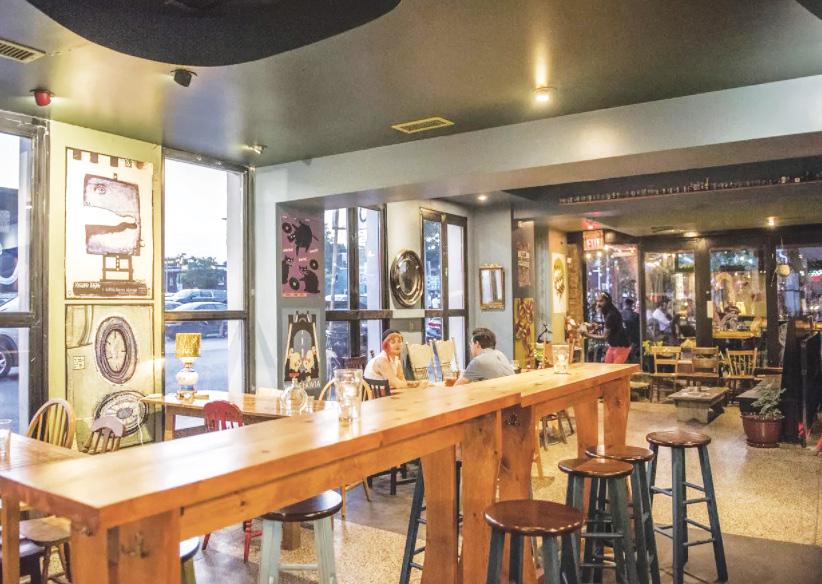
4 minute read
DROM Taberna — a loyal fixture of Nordic and Eastern European food and music in Toronto
VINCENT TEETSOV
In the 2014 documentary Toidutoojad: Ajaloolised eesti toiduärid Torontos (Makers of Food: Historical Estonian Food Businesses in Toronto) – produced by Piret Noorhani and Riina Reinvelt, and directed by Kaisa Pitsi – the cumulative impression made in Toronto by Estonian food-based businesses was shown to be substantial.
Advertisement
In one interview, Laas Leivat remembers that as a teenager, “there were maybe six to seven food shops” run by Estonians. One of these was Rooneem’s Bakery, which “had the very best light rye” (peenleib).
For bakeries like that of Hugo Rooneem’s, there was a steady demand for baked goods because of the high number of immigrants and refugees from Europe. Certainly enough demand for good, dense, flavourful bread that you could make some open faced sandwiches with, or sizzle on a pan with some butter in the morning.
Aino Rooneem, Hugo’s wife and the bakery’s bookkeeper, described Hugo’s beginnings at his family’s bakery in Tallinn. Once in Canada, he started by baking bread in the evenings at the Swedish bakery where he worked, and sold it to Estonians after their church services had ended. It was a passion. It was hard work, too, working late nights and early mornings, as bakers do, to keep up with orders. Rooneem’s Bakery expanded into offering lunch and became a hopping spot for treats ranging from slurps of soup to bites of cake. In the late 90s, the bakery closed. The bakery had occupied 468 Queen Street West and later 484 Queen Street West. These are now SVP Sports and a closed down Taco Bell, respectively.
It would be a sad way to end the saga of a decades long business with its closure. Furthermore, it would be a skewed interpretation of the area where it was located. Queen West has changed dramatically, and will likely continue in this way. However, one business, which is just a few steps away from where Rooneem’s Bakery stood, has proudly and actively put a spotlight on Nordic and Eastern European traditions. That place is DROM Taberna.
Maybe you’ve been there before? If it’s not familiar to you, you might have heard about it in the context of the Estonian folk duo Puuluup. Ramo Teder and Marko Veisson played at DROM Taberna (which you’ll often hear referred to simply as “Drom”) two days after their Estonian Music Week show in 2019.
Opened in 2018 at 458 Queen Street West, a building that’s just over 150 years old and which formerly housed Tortilla Flats, this restaurant has served the area with zippy food and drinks that you would indulge in on a trip from Finland to Bulgaria. In fact, according to them, “In Romani [the language spoken by the Romani people] Latcho Drom means ‘safe journey.’ Drom is a Slavic loan word that means voyage, travel, adventure, the open road…”
The thing that gets patrons to stay through the night at the restaurant is the vivacious live music they host. Like Lula Lounge and Hugh’s Room Live have also done, they offer a broad folk and jazz music selection. If you want to stomp your feet with abandon to fiddles and accordions, look no further.
When it was hot and Torontonians were basking in the city’s celebrated patio scene, Drom was an oasis. Even in colder times, music happening at the corner of Queen and Augusta has spilled out onto the street and brightened up everyone’s days. In the pickup/ delivery age, it’s still doling out borscht and cabbage rolls to happy customers.
The designer behind countless memorable nights here is Shamez Amlani. Amlani has curated these types of friendly cultural environments before. As mentioned by Blog TO, he is “one of the original organizers of Kensington Market’s Pedestrian Sundays.” Amlani is also co-owner of nearby French bistro La Palette, where you can gaze into a glass of Beaujolais and pull apart some slowbraised duck confit.
A trip to Drom is educational. You’ll be told a bit about where the dishes originate from, their specific ingredients, and mode of preparation. These are the details and signals of restaurateurs caring about their enterprise, and for a visitor, it makes it all the more memorable.
Normally, there is room for 75 people, and space is usually cleared for musicians and dancing. Groups like Balfolk Dance Collective and the Toronto Klezmer Society have come through for weekly dancing and jam sessions. Rooneem’s, and all of the Estonian food businesses of Toronto, have shown us what some good food and company is capable of building, and those values haven’t disappeared.
Let’s not despair about what has ended, but rather, look for and champion the places that remind us of great things we’ve had. There is common ground to be found in looking into the offerings of Estonia’s neighbouring cultures, while sharing our own customs in return. And there’s no way of knowing how that exchange might create more ways to enjoy our Estonian culture.

Photo: Hector Vasquez










